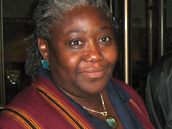Writings / Fiction
Moonlit Dreams
Bunmi Oyinsan
Hauwa paused just outside the door of Alhaji’s living room. She set the tray of Faten Dankali* made with huge chunks of spicy chicken on the floor and knelt beside it to adjust the green and white antimacassar which Hajia always insisted on placing over the fancy enamel bowls in which she served Alhaji’s meals. She usually served lunch in a set of enamel bowls which had bold white, blue and yellow abstract designs that had been part of her own bride-wealth but for supper, she used a set with red, green and yellow flowers which had been part of Hauwa’s. As Hauwa got up slowly, determined to the delay the moment when she would have to knock on the door, the voices of other children playing moonlit games in the next compound caught her ears.
“Dan sofo!”, a boy’s voice rang out.
“Gamus, Gamusu!”, other children responded gleefully and Hauwa dropped back to the floor crouching as though in physical pain. How she had come to hate nights, especially moonlit ones. Playing inside her father’s compound on nights such as this when the moon was large, full and bright had been the highlight of her days until a few weeks prior when she had been led, singing and dancing to Alhaji’s house. She scowled at the memory of her happy, excited self on that day, with her hands and feet beautifully decorated with intricate laali+ designs. Like most of her friends, she had been raised to look forward to her wedding day but never beyond the pageantry of the day and so she had not dreaded the night.
Her wedding night was one almost exactly like this and she winced as her errant mind willfully recalled the agonizing picture of her body wracking in pain as she laid curled up like a baby as far away as she could get from the satiated Alhaji, who slept sprawled beside her at the centre of the king-sized bed. Hauwa had been astonished at how nonchalant the moon looked through the heavy curtain which someone had failed to close properly. Her eyes had quickly latched on the moon like a lifeline when she first realized she could see it. But it remained aloof, sultry and shining and completely oblivious to the pain which continued to sear through her pre-teenage body.
She was suddenly startled by the light touch of a hand on her right shoulder. She had remained in a half sitting, half crouching position by Alhaji’s door. Torn between the paralyzing and repugnant memory of her wedding night and the carefree sound of her peers playing in the next compound, she failed to register the faint whiff of urine which, ordinarily, would have alerted her of Hajia’s approach. As the startled Hauwa tried to get up, fearful she would be scolded for letting Alhaji’s meal get cold, Hajia reached for the tray. In a whisper more subdued than her normal mournful voice, she told Hauwa she would serve Alhaji his meal. Relief flooded Hauwa’s lithe body like a river and she sprang to her feet, breaking into a run. But as she began making her way back to the women’s section of the compound, she turned back and caught sight of Hajia’s face, who then turned and proceeded to rap timidly on Alhaji’s door. Once again, Hauwa marveled at how out of place Hajia’s beautiful, round face looked on top of her haggard, worn body.
“The girl is not feeling very well today so I’ve brought your food myself. She will be better tomorrow, Insha’Allah^.” Hauwa heard Hajia explain, her voice painfully apologetic as she offered herself in place of her young co-wife.
Glossary
* Potato Porridge
+ Henna
^ If God wills.



